by Jenny Rose | Mar 9, 2017 | A Flourishing Woman, Body, Food
This is a third post in a series in which I’ve questioned the relationship between American dietary standards and health and written about my own personal journey with diet. This week I’ll focus on some of the ideology embedded in diet and food production.
In my first post, I briefly mentioned vegan bullying. Because of the way we choose to eat, my partner and I spend some time in digital conversations about food. I’ve been amazed by the hostility and hatefulness directed towards people who choose to produce, harvest and/or eat meat.
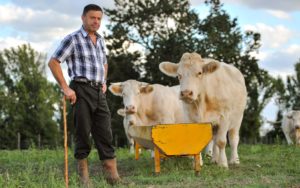
Photo by Agence Producteurs Locaux Damien Kühn on Unsplash
All people need to eat in order to live. That’s a given. I believe most individuals want to be able to feed themselves and their families with high-quality, healthy food. Sadly, because we live in a capitalist and consumer culture, this basic need is hugely impacted by financial, political, social and geographical variables. Additionally, diet is inextricably entwined in the religious and spiritual framework of many people.
Just this short list of factors make the basic necessity of putting food in our mouths complicated. Obesity and other eating disorders, as well as food-related diseases and health issues (which may be to say all diseases and health issues) reflect that.
Add to that a small but vocal group of people who take it upon themselves to judge, criticize, bully, shame and threaten others about their diet, and we’ve got a mess.
Now, there are all kinds of stated reasons why some people think they have a right to mandate what and how we all should eat. Some folks claim to be animal rights activists. Some talk about guilt, as in “What do you do about your guilt about eating the flesh of a dead animal?” Others say cows are killing the planet.
The list goes on. You get the idea.
I’m not a science teacher and this blog is not about handing out an academic education, but the cows killing the planet thing belongs under the heading of alternative facts. It simply isn’t true, and a brief survey of science-based permaculture, climate change and basic biologic history demonstrates that. Properly managed, the presence of animals is essential to healing the planet. Believe it or don’t believe it, but for me this is nonsense and I’m not interested in debating it.
The animal rights activism excuse really gets under my skin. First of all, equating eating meat with hating animals is first grade level reasoning. The world is filled with hunters who deeply respect and love the land and the animals they hunt and harvest. They show that respect by protecting the health of wildlife and wild land, doing their best to get a clean and efficient kill shot, using all of the animal they kill and supporting sustainable hunting practices. Of course, there are plenty of the other kind out there, lots of idiot trophy hunters and poachers who need a rack or a pelt in order to feel powerful. I don’t deny it. What I do say is that hunters are like everyone else — some are respectful and see themselves as part of the system we inhabit, and others operate strictly from power-over and see themselves as masters of the universe.
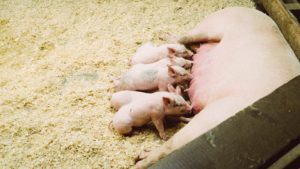
Photo by Greg Ortega on Unsplash
This also holds true for food producers. A small family farm hand raising meat with love, affection, attention, rotational grazing on healthy land and a good natural diet is a beautiful place. These people love their animals and the land. They also slaughter, butcher and eat their animals. They participate in, understand and respect every part of the cycle, from breeding to table.
To equate something like that with the nightmare of some modern mass meat production is simply ridiculous. If you want to see cruelty to animals, all you have to do is whisper “profit” into the ear of a corporation. Big Oil, the cosmetic industry and the fashion industry are just a short list of entities who have done plenty to destroy animals and habitat, and most people don’t care.
Incidentally, I’ve spent much of my life involved with animal rescue. I’m proud to say my mother is one of the most talented people I’ve ever met or heard of with animals and she’s largely given her life to making the world a better place for them, particularly horses and dogs, but by no means exclusively. This has all been volunteer work, done out of respect and love for the life in the world that can’t fight or speak for itself. She doesn’t see herself as better than. She sees herself as part of. The animals honor her with their presence and companionship, not the other way around.
So, yes, I eat meat with great enjoyment, AND yes, I love animals. I’m not limited by an inability to dwell in the sacred and powerful duality of life and death.
Bigger than all of this, however, is the guilt aspect, the real heart of this post. A vegan asks, “What do you do with your guilt about eating dead animals?”
For me, this question is much bigger than an issue of diet. The question reflects just how far we’ve strayed from wisdom, health and sanity in this culture.
When did we become amputated from our rightful place in the complex, miraculous web of life around us? What are the roots of the tragic and fatal arrogance that makes us believe we’re in control of life and death in our complex system? At what point did we become estranged from aging, loss, death and decay, which is to say HALF the full, powerful cycle of life?
Life is death. Death is life. Neither has meaning without the other. Both are essential. All life feeds on death. When we walk in the forest we’re walking on death. The whole natural world is based on prey and predator, eaten and eater. What does a tree do about its guilt as it feeds off and roots in the bodies of its companions? What does an eagle do with its guilt when it takes a salmon? What does a lion do with its guilt when it runs down a gazelle?
The guilt in that question is a projection. I don’t have any guilt about eating meat, and I think it’s tragic that anyone has guilt about the necessity to eat. If you pull up a carrot and eat it, you kill it. Every bite of food we put in our mouths is possible because of death. We exist as part of a vital, dynamic and inestimably beautiful and precious system that ebbs and flows, dances, fluctuates, cycles and revolves around life and death. We can choose to act as a unique and valuable part of that system by using only what we need, nurturing and learning from the life around us, and joyfully participating in all the ongoing life-death-life-death cycles around and within us, or we can choose to deny, destroy, and/or desperately try to control life and death, which is a completely fruitless (no pun intended) endeavor. We, thank God, are not that powerful.
The seasons will cycle. New life will be born in the midst of death. The green world will reseed itself, sprout, grow, bloom, fruit and die. The microscopic world and fungi will continue to break death into a rich placenta that sustains the next generation of life. Life is an incredible privilege. Death is part of that privilege. Nurturing life and allowing to die what must is part of what it means to me to be a woman.
I don’t know what’s going to happen to my country, the climate, or the planet. I’m afraid for us all, and the world we call home. What I do count on is the mighty cycle of life and death. All things change. All things move and flow. Nothing ever stays the same. All our fear and desperation, our greed and selfishness can’t change life and death.
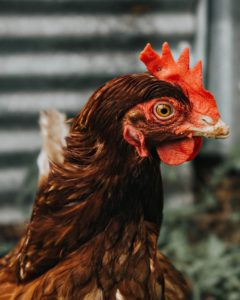
Photo by Andrea Tummons on Unsplash
What I can do is figure out how to best support my body with food. Then, I can make choices about how I procure the food I eat — to some degree. I don’t have the means right now to grow my own meat. However, I can and do buy eggs from a neighbor farmer, driving very carefully into the yard so as not to run over her free-range chickens and ducks. I can take the time to relish and appreciate opening a many-times recycled egg carton and looking at a whole variety of shaped, sized and colored eggs, mixed with occasional bits of straw and feather fluff. I can save money so I can buy a half an animal in the fall from a local small farmer to put in the freezer. I can buy fresh local yogurt, butter, cream and cheese from the farmer’s market.
It seems to me our energy should be going into making sure everyone has adequate food and clean water, and that we treat our food sources, whether animal or plant, and the system within which they grow (you know, the planet? Earth?) with love, intelligence and respect. We all can do something about food. Those among us who are doing the hard and unprofitable (financially) work of growing food on small farms may well hold the keys to our future survival. What they know about permaculture, holistic environments, food forests, sustainability, breeding, planting, harvesting and slaughtering is truly the wisdom of life.
Which is to say the wisdom of death.
Which is to say, again, the wisdom of life.
Bon appetit.
See the fourth post in this series here. Check my Resources page for links to information about diet and nutrition.
All content on this site ©2017
Jennifer Rose
except where otherwise noted
by Jenny Rose | Mar 2, 2017 | A Flourishing Woman, Body, Food
Last week I considered several questions about the politics of food. This week I want to share a reluctant personal journey.
Before going further, I want to clarify I’m not a dietician, a nutritionist, a doctor, or qualified to give any kind of diet or medical advice, nor am I interested in doing so. I am, however, the number one expert on my life and my body.
Until the last three or four years, it never occurred to me to be baffled about why eating by all the latest advice and rules hasn’t helped me with chronic pain and some of the other issues I listed in the first post on this topic. My whole life was like that. I’ve always felt I played by all the rules and things didn’t work well in any arena. Eating well and not feeling well didn’t exactly stand out. I assumed it was because I’m broken and flawed.
On the other hand, I know from my years of medical transcription work many people out there try desperately hard to adhere to their healthcare team’s recommendations in regard to diet, exercise and medication, but they still struggle with obesity, diabetes, heart disease, pain and mental illness, to name but a few. There are cheaters, of course, but most of those patients freely confess they’re noncompliant. Are all these compliant patients, and I assume hundreds of thousands of others like them, as broken and flawed as I am?
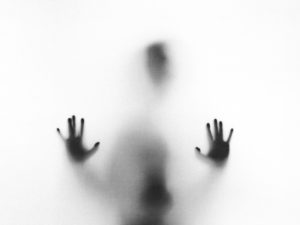
Photo by Stefano Pollio on Unsplash
And what about the frequent headlines regarding young, fit, athletic, active people, including vegans and vegetarians, having heart attacks and/or dropping dead? This week it was the ‘Biggest Loser’ host and trainer, Bob Harper. According to all official guidelines, those folks should live to 100, right?
So, I ask again, what the hell is going on here?
I realize now I’m not broken and flawed, at least not more than anyone else. The problem has simply been my diet. It’s always been my diet. Eating the way we’re all supposed to eat has not, does not, and I’m convinced will not ever work for me.
Three years ago, I was introduced to the idea of a ketogenic diet. It’s gradually become more and more present in the popular press, but I’d never really heard about it. I didn’t think I had a problem with gluten, and my own homemade bread formed an enormous part of my daily intake, so low-carb eating had no appeal. The other half of ketogenic was even less appealing — eating meat and animal fat. I hated feeling worn out, used up and too skinny, but I didn’t want to be fat. Eating high fat is bad for you — everyone knows that. I’d never eaten a lot of meat and didn’t feel I had the money to start. I’ve never had a great appetite, though strangely, I was usually snacking, but meat wasn’t that appealing. When I wanted a snack, I wanted a thick slice of homemade toast with margarine and a cup of tea with honey.
I formed a relationship with a ketogenic eater, who I thought was frankly boring about diet. He was a converted vegetarian and believed his plant-based diet had given him a near-fatal heart attack. On the other hand, he was (is) smart and had done a lot of research, which I respected. Unwillingly, but curious in spite of myself, I began to look at some of the information he shared.
At the time, I was hypothyroid, on medication; suffered from constipation, insomnia, and my usual mild-to-moderate mix of anxiety and depression. All of that was a cake walk, though, compared to my problems with muscle spasm and back pain.
For most of my adult life I’ve had pain problems. At one time, I was diagnosed with fibromyalgia, but I refused treatment, which consisted of pharmacology. I had frequent spasm in my neck, shoulders, back and hips, at least every couple of months, lasting for several days. The spasm at times made it impossible for me to sit at my desk and work, drive, and sometimes even shower. Triggers would be things like putting my foot up on the edge of the tub to put lotion on my leg, or sneezing. I walked every day, danced when I was able, worked in my garden and generally was active, but if I did any kind of exercise routine or repetitive motion I was sure to get into trouble. I couldn’t do yoga without dire consequences.
It was truly miserable, and I’d tried every modality I could think of over the years. Nothing gave me more than short-term relief. I had no hope of ever solving the problem, or even understanding what the problem was.
I knew low-carb, high-fat couldn’t possibly be the answer, because it’s not the well-rounded, well-balanced, high-fiber healthy eating I knew we need to do to stay well. I didn’t want to give myself heart disease or cancer on top of everything else. On the other hand, my friend claimed to have cured his heart disease eating keto, and he had the blood work, strength and endurance to prove it.
Huh.
So I read. I read about the biochemistry of inflammation, the essential biochemical role of cholesterol in our bodies, and early studies on cholesterol and its supposed link to heart disease. I read about saturated fat. I read about studies of indigenous people and dentistry. I also read criticisms and counter-arguments to most of those studies. I read about cherry-picking data and bias. I read studies and data paid for by the sugar industry, the beef industry, the dairy industry, Big Pharma and Big Ag.
My conclusion is that it’s difficult and time consuming to get reliable scientific data that’s unbiased about food. There’s “evidence” for just about every diet being The Right Way To Eat.
Then I started reading blogs and articles written by real people who are trying to get and stay healthy and understand what their bodies need. They’re not selling anything. They’re not trying to tell everyone else what to do. They’re living in their bodies, just like me.
During all these months of research and reading, a few things really stood out. Eating keto has a profound effect on diabetes, inflammation and a host of other maladies, and there’s plenty of science to back it up. I found whole communities of people healing themselves, learning together and exchanging information about what works in their bodies, many of whom have literally transformed their health with a zero-carb diet.
Keto diet is not mainstream. It doesn’t incorporate the food pyramid. Most doctors don’t recommend it.
Does that make it invalid or (even more ridiculously) morally or ethically wrong?
In the meantime, I moved to Maine and started living with my low-carb, high-fat eating guy. Gradually, I began to eat more like him.
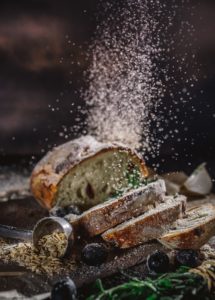
Photo by Helena Yankovska on Unsplash
I fought it every step of the way. I was like a bag of weasels when I gave up my morning (and midmorning and afternoon) tea with honey. What was tea without honey? I craved bread, homemade oatmeal, homemade scones and homemade gingersnap cookies. I was afraid to eat real butter. I decided this nonsense about vegetables and fruit was just that — nonsense, and I retained those in my diet, but I gave up bread and all grains. No flour. No rice. Goodbye amaranth, quinoa, cornmeal. No more homemade pancakes and waffles. No more buttered popcorn. I ask you, what is life without buttered popcorn?
I was feeling better. In fact, I noted I hadn’t had a back spasm since moving to Maine, an unheard-of period of time. I was also sleeping better. I had less bloating, water retention and gas.
I was disconcerted to find that I need to eat a lot. Much more than my male partner. It’s embarrassing. I discovered I had a lot of unconscious rules about Appropriate Eating For Women. I stopped worrying about keeping weight on and waited to get fat. I was eating more than I ever had before, and most of my calories were coming from animal fat.
I continued to feel better. I didn’t get fat. I’d read that fat doesn’t make you fat; carbs make you fat. I began to believe it. I felt healthy and strong and my weight was perfect. It stopped swinging up and down. I wasn’t cold all the time any more. I had more energy. My carb cravings stopped. I didn’t snack anymore. I got up, ate four or five eggs scrambled in butter on a bed of fresh spinach for breakfast, along with several strips of bacon and some fresh fruit, and then I started my day and didn’t even think about food until sometime in the afternoon, at which point I ate a ½ plus pound burger, mixed 70/30 with fat. Just the burger, mind you. Well, maybe a piece of cheese melted on top. When we were in funds, I ate a ¾ pound ribeye with lots of delicious fat.
Usually we are not in funds, however, and one day I ran out of spinach and fresh fruit at the same time. For a few days, there were only bacon and eggs for breakfast. Then we got a paycheck and I happily went and bought spinach and tangerines again.
Guess what?
Pain.
Not spasm, but pain in all the old places — hip, low back and neck. I ached. I was stiff. I couldn’t sleep.
I was furious. I was scared. People HAVE to eat vegetables to stay healthy. They’re essential. I love fresh fruit.
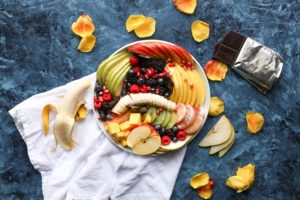
Photo by Brenda Godinez on Unsplash
I was not going to give up fresh fruit!
Eventually, I gave up both vegetables and fruit.
As of this writing, I no longer take vitamin or herbal supplements, with the exception of magnesium, one a day, and a melatonin at bedtime. I take no prescription meds. I drink lots of water and unsweetened tea, mostly herbal and green. I’m no longer hypothyroid, proven by blood test. I’m almost never cold. I still struggle with eating enough, but if I eat more than a pound of meat a day (not counting eggs and butter), I don’t get faint or hypoglycemic. My migraines are less frequent. My weight is dead steady. I have no trouble at all with my digestion. My BMI is perfect. As long as I eat enough, I have loads of energy. I stretch, dance, swim, walk, shovel snow and lift weights with no problems. I’m not short of breath. I sleep like a rock but rarely need to nap during the day.
I haven’t had a muscle spasm now for more than two years. I haven’t had a cold or a sinus infection. My nails are supple and strong. My hair is curly and wild and thick. My skin is great.
I’ve never felt so good, and I’ve never been so healthy.
I’ve broken most rules of mainstream “healthy” eating.
Go figure.
This discussion of diet continues here and here. Please see my Resources page for links to diet and nutrition information.
All content on this site ©2017
Jennifer Rose
except where otherwise noted






